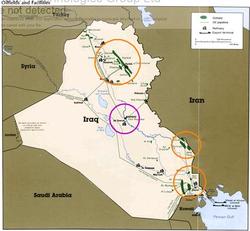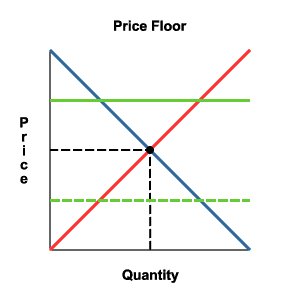That’s the big danger Iraq poses in The War Against Oil.
Victory will be as the Bush Administration has always defined it, even while they were putting out cover stories about democracy. Victory will mean accessing Iraq’s oil reserves. That process has now begun. (In the map to the right, from Nun of the Above, the oil reserves are inside the orange circles.)
Why is victory defeat? Because Iraq has a huge pool of oil, very close to the ground, and very close in turn to the world’s markets. The oil companies now starting to work there estimate they can add 1 million barrels per day to the world’s supply, each year for five years. With supply and demand balanced on a knife edge, this is enough to send prices plunging.
How far? No one can imagine those numbers now any more than they could imagine the numbers now being paid a year ago. Most people are lacking in imagination.
Why is that bad? Low oil prices reinforce our dependence on foreign oil. They transfer our wealth — all of it — to the Middle East, and leave nothing for the Middle West. And by the time prices start rising again it will be too late to do anything about global warming. The tipping point will have been passed, the destruction of Florida (and New York, and all the world’s other low-lying cities) will be irreversible. The population of the Earth will decline by billions during this century, which means your children will probably die young, and their children, and their childrens’ children.
What is at stake in the real war we must fight is the Earth itself. Lose the Earth and mankind has no home. Men will butcher one another, starve one another, fight one another to the death for the highest peak, the last bit of food, and civilization will perish in the process. Armageddon. Mass suicide through mass genocide.
The people pushing this Iraqi policy know nothing of any of this, but scientists are very clear on it. Questioning the science of global warming at this point is just like questioning evolution, which may be why policy advocates who know better do that, too. But science is not a question of belief. You can accept its verdicts or ignore them and suffer the consequences. There is no such thing as ignoring the verdicts of science and the consequences not coming.
Why are conservatives doing this? Because dominance of extraction industries means dominance of all policy by those within the extraction industries. It’s all about control, control by the current money power, the current political order, the current oligarchy. It’s truly conservative in that it’s a fight against change, a fight to retain existing status and privilege.
The present crisis represents a once in a generation opportunity to break this cycle of dependence. It’s a cycle which runs through Saudi Arabia, through Dubai, and through New York and Houston as well. Americans pretend to be the dog in this cycle of dependence, but they’re now the tail, wagging the dog. We’ve become low-level pushers of the oil drug on our own people, street dealers pretending to be big bosses. The new capital of the world is Dubai.
What the last five years of war have done is establish a new pecking oil among those taking the lion’s share of the proceeds. More will now be Shia. Fewer will be Sunni. And with Shia gaining in wealth through Iraq, and American oil technology, the Iranian government will come around to the same technology, adding more supply. The Russians will add their voices to the chorus, and you will never get off the oil drug, ever. It will kill you, and your children, and you won’t have any grandchildren.
It’s a clear and present danger. But there is an alternative.
This is just what we have done with agriculture, and for the same reason. To assure supply. The difference is that instead of directly paying suppliers who get less than the floor, we tax those who produce at less than the floor.
Through taxation, Europe has been trying to establish a floor price for oil, but in the process they have just become co-dependent. That is, European tax coffers now depend heavily on oil taxes to stay in balance. They are dependent on oil taxes just as the U.S. government a century ago was dependent on tariffs.
The solution a century ago was to institute income taxes. Tax income rather than imports, and trade expands. A floor price is the equivalent policy for our time. The difference between this policy and what Europeans have done through taxes is that money below the floor will stay in private hands.
A floor price means that any alternative energy forms — wind, solar, geothermal — which can be produced and brought to market for less than the floor price will turn a profit. Hydrocarbons produced below the floor price are taxed to the floor. (In practice the market price never goes below the floor — there are no tax revenues here.) The economy learns to live on the floor price.
A floor price provides an incentive for wind, geothermal, and solar to thrive. It also limits our imports and use of hydrocarbons. Gradually we will develop a competing energy hierarchy, a real domestic energy industry which can stand against the oil power in Washington and elsewhere. This new economic power will include technologists, and bankers, creators of new infrastructure and (most of all) exporters.
What happens to those countries which don’t institute a floor price? In the near term they get energy below the floor price. In the near term China and India get an advantage. But their lack of a floor price assures us that they don’t develop these new technologies, and this new infrastructure, which can make the production and transportation of goods truly self-sustaining. They risk becoming as dependent on us in the future as they are on the oil power in the present. In time they will come around.
A floor price is how we win the War Against Oil even if the worst happens, which is that Iraq’s reserves are brought to the market and the price of oil comes down.
A floor price is essential to victory in The War Against Oil.











But if China and India don’t get with the program, the pollution their continued industrialization will produce over the next 30 years will more than offset any reductions made by the post industrial nations. This is the real challenge in the war against oil — dealing with the half of the worlds population that is just starting to get hooked. Our policies get just address our own oil dependence if they are going to have any real impact.
But if China and India don’t get with the program, the pollution their continued industrialization will produce over the next 30 years will more than offset any reductions made by the post industrial nations. This is the real challenge in the war against oil — dealing with the half of the worlds population that is just starting to get hooked. Our policies get just address our own oil dependence if they are going to have any real impact.